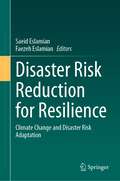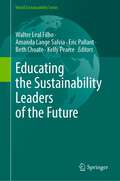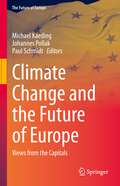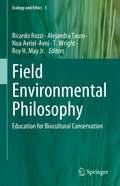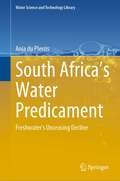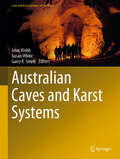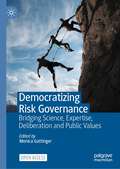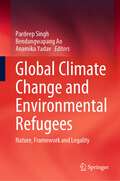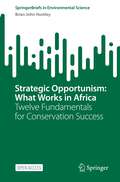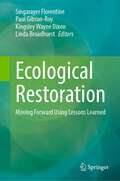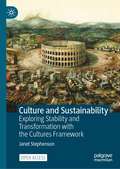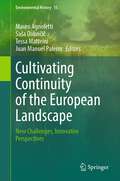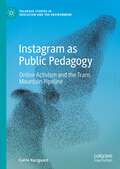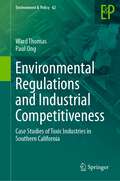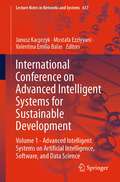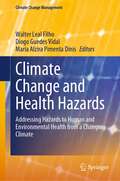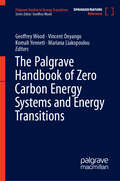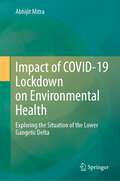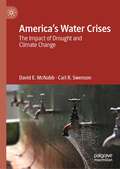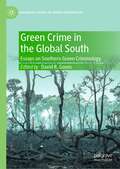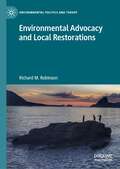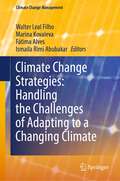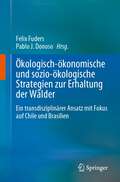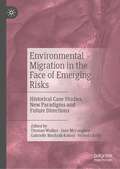- Table View
- List View
Disaster Risk Reduction for Resilience: Climate Change and Disaster Risk Adaptation
by Saeid Eslamian Faezeh EslamianThis book is part of a six-volume series on Disaster Risk Reduction and Resilience. The series aims to fill in gaps in theory and practice in the Sendai Framework, and provides additional resources, methodologies, and communication strategies to enhance the plan for action and targets proposed by the Sendai Framework. The series will appeal to a broad range of researchers, academics, students, policy makers, and practitioners in engineering, environmental science and geography, geoscience, emergency management, finance, community adaptation, atmospheric science, and information technology.This volume offers indigenous approaches to disaster risk reduction, community sustainability and climate change resilience, as well as agro-ecological innovations for improving resilience to climate change. The focus is on adaptation strategies for sustainable terrestrial and marine ecosystems to reduce the impacts of anthropogenic factors that exacerbate disaster risk, including hydro-meteorological services for climate resilience, food security measures in agriculture and livestock, flood mitigation plans, and increased climate change education and awareness. The book concludes with three case studies in Africa detailing the impacts of strengthened climate change resilience measures, adaptive social protections, and improved water availability through hydro-electric technologies.
Educating the Sustainability Leaders of the Future (World Sustainability Series)
by Walter Leal Filho Amanda Lange Salvia Eric Pallant Beth Choate Kelly PearceThis book focuses on 'educating the sustainability leaders of the future' and will contribute to the further development of this fast-growing field. As the title suggests, it presents practical experiences related to education, research and extension, the so-called third mission, whereby universities conduct outreach to society as a whole (e.g. to local communities, organisations, industry, and other groups) with the aim of documenting such experiences and making them available to a wide audience. This book is produced by the European School of Sustainability Science and Research (ESSSR), through the Inter-University Sustainable Development Research Programme (IUSDRP) and contains inputs from authors from across all geographical regions. It gives a special emphasis to the participation of future generations on sustainability efforts. The book also discusses examples of initiatives coordinated by universities but involving civil society, the private sector, and public sector (including local, national, and intergovernmental bodies). In particular, it describes practical experiences, partnerships, networks, and training schemes for building capacity aimed at fostering the cause of sustainable development at institutions of higher education. Thanks to its design and the contributions by experts from various areas, it provides a welcome contribution to the literature on sustainable development, and it inspires further works in this field.
Climate Change and the Future of Europe: Views from the Capitals (The Future of Europe)
by Michael Kaeding Paul Schmidt Johannes PollakWhile the ambitious objectives outlined in the EU’s Green Deal aim at making Europe the first climate-neutral continent by 2050, national implementation greatly varies depending on local geographies, history, culture, economics, and politics. This book analyses Member States’ and EU neighbours’ national efforts to combat climate change. It subsequently draws on these factors to highlight local challenges, tensions, and opportunities on the road towards climate neutrality. In the context of inter-country dependencies following Russia’s war against Ukraine, it addresses strategic questions regarding EU integration, the transformation of our economies, the reduction of energy dependencies, and public perception of the above. The book also makes concrete recommendations, in various policy areas, on how individual countries and the EU as a whole should deal with the climate crisis.
Field Environmental Philosophy: Education for Biocultural Conservation (Ecology and Ethics #5)
by Ricardo Rozzi Roy H. May T. Wright Alejandra Tauro Noa Avriel-AvniThis fifth volume in the Ecology and Ethics series integrates key concepts of the previous four volumes by addressing biocultural conservation through novel educational methods. In Field Environmental Philosophy (FEP), the authors undertake two complementary tasks. First, they address a problematic facet of education as an indirect driver of a global change and biocultural homogenization. Second, they contribute to solve the former problems by introducing the FEP method as well as other educational approaches from around the world that value and foster conservation of biological and cultural diversity. A particular emphasis is therefore on the integration of sciences, arts, humanities, and ethics into educational practices that involve the participation of local communities with their diverse forms of ecological knowledge and practices. The book is divided into four parts. Part I introduces FEP concepts and practices that involve a 4-step cycle of transdisciplinary research, poetic communication through composition of metaphors, design of field activities guided with an ecological and ethical orientation, and participation in biocultural conservation activities. Part II exposes problems as well as solutions in formal education (from preschool to higher education) and non-formal education to respect biocultural diversity. Parts III & IV provide case studies developed at long-term socio-ecological research (LTSER) sites, botanical gardens, and other platforms for non-formal education that contribute to biocultural conservation.This book supports a paradigm shift addressing still understudied indirect drivers of global change to foster the conservation of biological and cultural diversity. It is a valuable asset for scientists and practitioners in science and humanities education.
South Africa’s Water Predicament: Freshwater’s Unceasing Decline (Water Science and Technology Library #101)
by Anja du PlessisThe book provides a critical evaluation of South Africa’s freshwater resources to illustrate the way in which its freshwater resources, water access, services and infrastructure have continued to decline over the past three decades. The continued decline of water governance, management, water service delivery, dilapidated water infrastructure, dysfunctional local governments and overall excessive water degradation is illustrated and emphasized using real-life examples and case studies from various contexts within the country.The main argument of the book is that South Africa’s freshwater resources have declined to such an extent that it can be described as a predicament. Questionable water governance decisions and reactive water management practices have led to no improvement and/or increased degradation of freshwater resources. An overall lack of service delivery exists across the country, in various contexts, leading to further water and social decline.An inter-disciplinary evaluation of South Africa’s current water predicament is provided, major water crises are prioritized, and suitable recommendations are given to transform its predicament into problems which can be addressed. Suitable background information is given to emphasize the necessity of good water governance, management, and service delivery. South Africa’s freshwater resources are evaluated with specific focus on the decline of informed water governance, management, service delivery and water quality. Factors requiring urgent attention are determined and suitable recommendations and/or actions are provided.An evaluation and overall synthesis focused on the transformation of the predicament into problems is provided. Primary water problems are prioritized according to urgency and suitable recommendations are given to assist in transforming the country’s current complex water predicament into “simpler” water problems. Political will, collaboration with researchers, stakeholders, non-governmental organizations, and cooperation of civil society is required.South Africa’s already scarce freshwater resources and decaying infrastructure will persist and possibly collapse if no major actions or interventions are implemented.
Australian Caves and Karst Systems (Cave and Karst Systems of the World)
by Susan White John Webb Garry K. SmithThis book, part of the series Cave and Karst Systems of the World, begins with a review of the interaction between people and caves in Australia (including conservation), followed by descriptions of the spectacular cave diving sites, before comprehensively covering all the major carbonate and noncarbonate karst areas, subdivided by rock type and region, and including the origin of the caves. This is followed by broad overviews of cave minerals and speleothems, cave biology and cave fossils. Each section was written by one or more specialists in the topic and is illustrated by clear diagrams and superb colour photos. The book emphasises the unique aspects of the Australian karst, including the variability in the age of the caves (very old to very young) and the impact of isolation on the stygofauna, as well as the vertebrate fossils preserved in the caves. Written in an easy-to-read style, the book is a primary reference guide to Australian karst and represents a valuable asset for anyone interested in the topic, not only cavers and academics.
Democratizing Risk Governance: Bridging Science, Expertise, Deliberation and Public Values
by Monica GattingerThis open access book features contributions from a multidisciplinary team of leading and emerging scholars focused on democratization of risk assessment, management, and communication. The volume identifies and sheds light on key risk governance dilemmas related to public trust, risk perception and public participation. The first part of the book articulates the relationship among science, expertise, deliberation and public values, featuring an in-depth analysis of the concept of ‘motivated reasoning,’ and the role of trust, values and worldviews in understanding and addressing contemporary controversies over risk decision-making. The volume’s second part features eight case studies from three policy fields – energy, genomics, and public health – and a special section dedicated to vaccine decision-making for Covid-19. Chapters analyze the level, nature and mechanisms of public involvement in risk decision-making, assessing its contribution to the effectiveness and legitimacy of decisions. The case studies focus predominantly on Canada, but they draw on global scholarship and are of direct relevance for scholars and practitioners of risk governance in any country.
Global Climate Change and Environmental Refugees: Nature, Framework and Legality
by Pardeep Singh Anamika Yadav Bendangwapang AoThis book explores the possibilities of understanding the concept of climate refugees in order to ascribe to a consensual agreement that climate refugees are evident and this situation is a reality.A framework to study both empirically and theoretically is presented in a detailed manner so that it may become a resource for understanding the challenges of climate refugees.Through discussion and analysis the book presents potential answers to such questions as:● Why has the international system been so short-sighted and has not given importance to the problems of climate migrants and refugees?● How to identify a climate refugee?● How do you justify a climate refugee or a migrant?● What are internally displaced people? Should we call them just refugees?The book covers the interdisciplinary nature of climate refugees and the perspectives of social science. The empirical findings provides an edge to holistically understanding climate refugees.This book discusses the concept of, what really is a climate refugee, and the necessary factors to make it an important part of the climate discourse. The legality of the term is missing in international parlance, and the academic discourse should provide the necessary critique required for the evolution of the subject under study. Therefore, the major objective of the book is to make the subject of climate migration known to all.
Strategic Opportunism: Twelve Fundamentals for Conservation Success (SpringerBriefs in Environmental Science)
by Brian John HuntleyThis open access book. provides a synthesis of six projects, across ten countries, each of which have been sustained for two or more decades, and which illustrate how success can be achieved regardless of systems of governance, of a nation’s wealth, or of culture. Detailed narratives are presented on the key personalities that have conceived, conducted and concluded long-term projects: personal stories of vision, failure, frustration and persistence ultimately leading to success.The case studies vary widely in their geography and goals. The single-handed commitment to re-discover the last surviving populations of Giant Sable in the miombo woodlands of central Angola, through the capture, translocation and establishment of robust breeding herds of this magnificent antelope, contrasts with the massively funded, three-decade programme with over one hundred participants that reversed the annual loss to predation by feral cats of 455 000 seabirds from a sub-Antarctic island. Similarly, the foresight of Zimbabwean and Namibian ecologists to place rural communities at the centre of conservation programmes by giving value to wildlife populations and benefits to local people, transformed a land degradation problem to a socio-ecological solution. Across ten countries, building capacity in botanical collection, documentation and herbarium management expanded into a global project to place the knowledge base of Africa’s flora onto an electronic data system accessible to researchers and conservation planners in even the most remote corners of the continent. None of these projects enjoyed immediate results. Each required leadership skills that combined vision, a generosity of spirit, fortuitous timing and the exploitation of unexpected opportunities.
Ecological Restoration: Moving Forward Using Lessons Learned
by Singarayer Florentine Paul Gibson-Roy Kingsley Wayne Dixon Linda BroadhurstEcological restoration, although a relatively new endeavour compared to other disciplines, has gained significant momentum during the last decade as accelerating global change becomes more apparent. It is now widely accepted by the scientific community that to avoid further devastating effects of climate change and biodiversity loss, humanity must determinedly move more to protect and restore natural ecosystems. Many restoration efforts of the past have been ad hoc, site and situation-specific and have often failed to achieve desired outcomes, but over the last decade, many countries are allocating increasingly significant amounts of financial investment towards restoration with the goal of achieving more systematic and predictable outcomes. Today, activities related to restoring ecosystems, natural assets and biodiversity are a global focus. This book covers a wide range of topics related to ecological restoration including for grasslands, wetlands, temperate and tropical forests and arid zones. Importantly, it also focuses on ecological restoration in human-disturbed landscapes such as for urban areas, farmlands, mine sites and transport corridors. It highlights the necessity for evidence-based approaches that are both nuanced and complementary with prescriptions for people-based restoration, that is socially inclusive and cognisant of historic and current community sentiment. Ambitious landscape and continental scale targets for ecological restoration have been set across the globe. However, without practical guidelines developed from restoration evaluations from the recent past to follow, future efforts are unlikely to be successful, nor -expected targets met. To that end, this book reviews and highlights a large number and variety of restoration stories from around the world. Most are presented as reader-friendly case studies, that feature innovative and systematic techniques for undertaking species-rich ecological restoration. Together they provide inspiration for current and future professionals and offer unique glimpses into state-of-the-art practice for this critically important discipline
Culture and Sustainability: Exploring Stability and Transformation with the Cultures Framework
by Janet StephensonThis Open access book brings a cultural lens, and a distinctive analytical framework, to the problem of transitioning to a sustainable, low-carbon future. The world faces a seemingly impossible hurdle – to radically alter long-established social, economic and technological systems in order to live within the biophysical limits of the globe, while ensuring a just and enduring transition. The overarching premise of this book is that this cannot be achieved without widespread cultural change. ‘We need a change in culture’ is often used rhetorically, but what does this really mean?Stephenson starts by exploring culture’s elusiveness, describing its divergent interpretations before identifying core features of culture that are common across most definitions. These characteristics form the core of the cultures framework, an extensively tested approach to studying the links between culture and sustainability outcomes. The framework makes culture an accessible concept which can be analytically applied to almost any sustainability problem. Using many examples from around the world, Stephenson illustrates how cultural stability, cultural flexibility and cultural transformation all have a part to play in the sustainability transition. She guides the reader in the use of the cultures framework for policy development and to underpin research undertaken by individuals or by multi-disciplinary teams.Clearly and engagingly written, Culture and Sustainability is essential reading for academics, students, policy makers and indeed anyone interested in a sustainable future.
Cultivating Continuity of the European Landscape: New Challenges, Innovative Perspectives (Environmental History #15)
by Mauro Agnoletti Saša Dobričič Tessa Matteini Juan Manuel PalermThis edited volume reviews 20 years’ worth of research under the European Landscape Convention. The authors from the research network UNISCAPE offer readers insights into their combined efforts to carry out and support the goals of a sustainable European landscape. 20 years after defining these original goals, the editors make landscape ecology and management, a cornerstone for the debate on a 21st century Europe. The numerous contributions cover the three major areas of Landscape Policy and Governance, Landscape Design and Time and Observing Landscape. The pan-European approach highlights the strength of international collaboration and interdisciplinary thinking.This book offers the collected knowledge as a working tool for researchers, scholars and professionals in landscape ecology.
Instagram as Public Pedagogy: Online Activism and the Trans Mountain Pipeline (Palgrave Studies in Education and the Environment)
by Carrie KarsgaardExploring Instagram’s public pedagogy at scale, this book uses innovative digital methods to trace and analyze how publics reinforce and resist settler colonialism as they engage with the Trans Mountain pipeline controversy online. The book traces opposition to the Trans Mountain pipeline in so-called Canada, where overlapping networks of concerned citizens, Indigenous land protectors, and environmental activists have used Instagram to document pipeline construction, policing, and land degradation; teach using infographics; and express solidarity through artwork and re-shared posts. These expressions constitute a form of “public pedagogy,” where social media takes on an educative force, influencing publics whether or not they set foot in the classroom.
Environmental Regulations and Industrial Competitiveness: Case Studies of Toxic Industries in Southern California (Environment & Policy #62)
by Ward Thomas Paul OngWhile polluting industries in the U.S. continue to emit billions of pounds of toxic chemicals into the air, land and water every year, many economists and policy makers argue that environmental regulations stifle economic growth and reduce the standard of living for the American people. This book takes a fresh look at this question through three case studies of highly regulated polluting industries in the Southern California region: metal finishing, wood furniture, and dry cleaning. The case studies are based on a mix of qualitative and quantitative methods, including in-depth interviews with corporate managers and environmental regulators. The authors find that there is no universal pattern for predicting the effects of environmental regulations on industrial competitiveness, but that the outcomes depend on the structure of the industry being regulated, the design of the regulations, and the technologies that are available for compliance. The book is written in straight forward language that is accessible to the non-economist and will prove an essential resource for academics and students of all levels, and professionals and policy makers in the fields of environmental policy and regional economic development.
International Conference on Advanced Intelligent Systems for Sustainable Development: Volume 1 - Advanced Intelligent Systems on Artificial Intelligence, Software, and Data Science (Lecture Notes in Networks and Systems #637)
by Janusz Kacprzyk Valentina Emilia Balas Mostafa EzziyyaniThis book describes the potential contributions of emerging technologies in different fields as well as the opportunities and challenges related to the integration of these technologies in the socio-economic sector. In this book, many latest technologies are addressed, particularly in the fields of computer science and engineering. The expected scientific papers covered state-of-the-art technologies, theoretical concepts, standards, product implementation, ongoing research projects, and innovative applications of Sustainable Development. This new technology highlights, the guiding principle of innovation for harnessing frontier technologies and taking full profit from the current technological revolution to reduce gaps that hold back truly inclusive and sustainable development. The fundamental and specific topics are Big Data Analytics, Wireless sensors, IoT, Geospatial technology, Engineering and Mechanization, Modeling Tools, Risk analytics, and preventive systems.
Environmental Public Interest Litigation in China
by Xiaobo Zhao Xi Wang Noeleen McNamaraThis book offers readers an accessible and broad-ranging guide to Environmental Public Interest Litigation (EPIL), which has burgeoned in China over the past decade. The aim of this book is to provide a systematic review of Chinese experiences with EPIL in environmental matters, both with a view to gauging its success to date and well as discussing some more critical aspects. To this end, the book systematically examines the establishment and development of EPIL in China's legal, social, and political contexts. It examines particularly the significant role and functions of EPIL in China's environmental governance, and the far-reaching impacts on Chinese civil society and governments. It also offers readers an insiders' perspective in terms of procedural and substantive issues with respect to EPIL, by reviewing the institutional designs, theoretical underpinnings and specific mechanisms, the roles of various participants and stakeholders involved in this legal process. At the same time, it studies leading EPIL cases raised from environmental pollution, natural resource damage and ecological damage, and the effectiveness of environmental adjudication that sustains EPIL as a new form of judicial instrument. This book is written to remedy the gap between Chinese and English literature in this area of law. The analysis of these issues, through a historic and comparative perspective, reveals the strengths and weaknesses of the current legal regime and serves as a basis for recommendations for bringing about more effective EPIL in China.
Climate Change and Health Hazards: Addressing Hazards to Human and Environmental Health from a Changing Climate (Climate Change Management)
by Walter Leal Filho Diogo Guedes Vidal Maria Alzira Pimenta DinisThis book contains a set of papers which explore the links among climate change, health, and hazards and demonstrate how they interact. It emphasizes the urgency of immediate and more ambitious action to address climate risks. According to the Intergovernmental Panel on Climate Change (IPCC), human-induced climate change is known to be causing dangerous and widespread disruptions in nature and is affecting the lives of billions of people around the world, despite efforts to reduce the risks. Climate change is also negatively influencing health and is mounting threat to our wellbeing and a healthy planet. The world is also facing significant climate hazards over the next two decades, with global warming expected to soon reach 1.5°C. Even temporarily exceeding this warming level will result in additional severe impacts, some of which may be irreversible. There is therefore a perceived need for publications which may foster a greater understanding of how climate change connects to human health and the role played by hazards in this context. It is against this background that this book is being prepared.
The Palgrave Handbook of Zero Carbon Energy Systems and Energy Transitions (Palgrave Studies in Energy Transitions)
by Geoffrey Wood Vincent Onyango Komali Yenneti Mariana LiakopoulouThe Palgrave Handbook of Zero-Carbon Energy Systems and Energy Transitions provides a comprehensive and authoritative source of information, analysis and recommendations on the multi- and inter-disciplinary subject of zero carbon energy systems. The Handbook will advance thinking and research underlying the on-going energy transition by; covering a wide range of energy technologies and sources (e.g. fossil fuels, renewables, low carbon energy) including investigating the potential of new and alternative technologies and fuel sources and looking at the power, heating/cooling and transport sectors; Looking at varied legal jurisdictions and governance approaches including developing and developed countries and investigating potential new approaches to achieving a zero carbon energy system; Providing a broad range of theoretical and methodological approaches from a range of disciplines; Inclusion of a global range of case studies from Africa, Arctic, Asia, Australasia, Europe, the Middle East, the Americas (Central, North and South) and the Pacific, from the international, national, sub-national to city/community level.
Impact of COVID-19 Lockdown on Environmental Health: Exploring the Situation of the Lower Gangetic Delta
by Abhijit MitraThis book examines the impacts that the COVID-19 lockdown has had on environmental and ecological health, with a focus on coastal ecosystems in the Lower Gangetic Delta. The book begins with an overview of COVID-19's spread and impact before and after the lockdown in the focus region, then addresses the specific impacts that the lockdown period had and continues to have on air quality, marine and estuarine water quality, coastal biodiversity, and the livelihoods of the region's inhabitants, especially those who live below the poverty line. The decrease in human activity combined with the complete closure of various sectors, including air travel, oil and gas drilling, and construction, has had a pronounced effect on biodiversity and overall environmental health that is yet to be fully realized. The book sheds light on these changes and assesses how biodiversity, ambient air quality, and ecosystem functioning will progress as COVID-19 remains a threat and the lockdown persists. The study will be of interest to researchers, government officials and professionals dealing with disaster management, environmental science, biological science, and health.
America’s Water Crises: The Impact of Drought and Climate Change
by David E. McNabb Carl R. SwensonThis book is focused exclusively on water problems in the 48 U.S. states. The authors provide an accessible overview of the work of many federal, state and academic researchers and water system administrators whose investigations have focused on the state of water and the water crisis now accelerating in the United States. David McNabb and Carl Swenson seek to bring to a wider audience some of the current research findings and data on the perilous state of the United States’ surface and groundwater resources during this time of climate change and the extreme drought taking place in many sections of the nation. Descriptions of the water resource systems are based on research and the subsequent findings published by water scientists in the United States Geological Survey, the Environmental Protection Agency, the U.S. Corps of Engineers and water related agencies of the Departments of Agriculture and of the Interior and state and local water management agencies.
Green Crime in the Global South: Essays on Southern Green Criminology (Palgrave Studies in Green Criminology)
by David R. GoyesThis book presents a socio-criminological study of environmental crime in the global South. It gathers contributors from all the regions of the geographical global South (Africa, Asia, Oceania, and Latin America) to discuss instances of environmental crime and conflict. Overall, it seeks to further decolonise the knowledge production of green criminology. It considers the legacy of colonisation, North-South and the core-periphery divides in the production of environmental crime, the epistemological contributions of the marginalised, impoverished, and oppressed, and the unique contexts of the global South. This book has three sections: drivers of green crime in the global South; responses to environmental harm in the global South; and global dialogues about crime and destruction in the global South. The first two sections represent the breadth of the topics that green criminologists have historically studied but from unique perspectives. The third section explores ethical and decolonial ways for Southern green criminology to collaborate with Western academia. This book speaks to scholars in criminology, political ecology, decolonial theory, along with the many readers interested in the interactions between humans and nature.
Environmental Advocacy and Local Restorations (Environmental Politics and Theory)
by Richard M. RobinsonThis book explores the leadership of state and federal environmental agencies and local environmental groups in restoring the degraded rivers that flow into North America’s Great Lakes and other sites in the northeastern industrial corridor of the US. Robinson examines twenty of the forty-eight sites included in the Areas of Concern Program of the Great Lakes Water Quality Agreement between Canada and the US. These twenty include heavily urbanized locales such as those along the River Rouge and Detroit River, but also more pristine locales such as the St. Louis River that flows through Duluth. Additionally, Robinson examines challenging river restorations within the northeastern industrial corridor which are led by effective local environmental advocacy organizations: the Penobscot Nation of Indigenous People, the Mystic River Watershed Association, and the Housatonic River Valley Association. All of these river restorations are led and managed by the environmental experts of (i) state and federal agencies, (ii) academia, and (iii) environmental NGOs. Local restorations of industrially degraded water bodies now compose a significant segment of the environmental movement and, ultimately, Robinson demonstrates that local environmental advocacy organizations can help marshal state and local funding for those efforts.
Climate Change Strategies: Handling the Challenges of Adapting to a Changing Climate (Climate Change Management)
by Walter Leal Filho Marina Kovaleva Fátima Alves Ismaila Rimi AbubakarThis book includes information, experiences, practical initiatives and projects around the subject matter and makes it available to a wide audience. It addresses the scientific, social, political and cultural aspects of climate change impacts and respective solutions in an integrated and coherent way.Climate change as a global phenomenon imposes new challenges for survival. Extreme weather events including heat waves, storms, droughts as well as rising sea levels, warming oceans and melting glaciers threaten people's livelihoods and communities, ecosystems and habitats. Furthermore, it affects the entire food chain and increases competition for natural resources fuelling socioeconomic tensions. The results of the latest IPCC report highlight the urgent need for combating climate change. The adaptation measures to be undertaken range across sectors, thematic fields and geographical locations.Based on this need, the book focuses on the high-quality, interdisciplinary contributions on the scientific, social, economic, political and cultural aspects of climate change challenges and solutions
Ökologisch-ökonomische und sozio-ökologische Strategien zur Erhaltung der Wälder: Ein transdisziplinärer Ansatz mit Fokus auf Chile und Brasilien
by Felix Fuders Pablo J. DonosoIn diesem Buch werden Strategien zur Verbesserung der Widerstandsfähigkeit und des Schutzes der gemäßigten Wälder in Südamerika vorgeschlagen, damit diese Wälder auf nachhaltige Weise Ökosystemleistungen erbringen können. Als solches trägt es zum Entwurf eines widerstandsfähigen Mensch-Wald-Modells bei, das die Multikulturalität lokaler Gemeinschaften berücksichtigt und in vielen Fällen Aspekte der ökologischen Ökonomie, der Entwicklungsökonomie und der territorialen Entwicklungsplanung einbezieht, die mit indigenen Völkern oder „First Nations“ zu tun haben. Darüber hinaus werden Vorschläge für öffentliche und territoriale Politiken unterbreitet, die den Erhaltungszustand der einheimischen Wälder und Waldökosysteme verbessern, und zwar auf der Grundlage einer kritischen Analyse der wirtschaftlichen Faktoren, die zur Degradierung der Waldökosysteme im heutigen Südamerika führen.Dieses Buch wurde von Mitgliedern des Transdisziplinären Forschungszentrums für soziale und ökologische Strategien zur nachhaltigen Waldbewirtschaftung in Südamerika an der Universidad Austral de Chile konzipiert. Es enthält Beiträge von renommierten Forschern aus der ganzen Welt, die die Bereiche Wirtschaft, Ökologie, Biologie, Anthropologie, Soziologie und Statistik miteinander verbinden. Es handelt sich jedoch nicht einfach um eine Sammlung von Arbeiten, die von Autoren aus verschiedenen Disziplinen verfasst wurden. Vielmehr erhebt jedes Kapitel den Anspruch, in sich selbst transdisziplinär zu sein. Dieser Ansatz macht das Buch zu einem einzigartigen Beitrag zur Verbesserung sozialer, betriebswirtschaftlicher und politischer Ansätze in der Waldbewirtschaftung, die dazu beitragen, die Ökosystemleistungen des Waldes zu schützen und nachhaltiger zu gestalten. Dies wiederum kommt den lokalen Gemeinschaften und der Gesellschaft als Ganzes zugute, indem die negativen externen Effekte der Forstwirtschaft verringert und die Zukunftschancen verbessert werden.
Environmental Migration in the Face of Emerging Risks: Historical Case Studies, New Paradigms and Future Directions
by Thomas Walker Victoria Kelly Jane McGaughey Gabrielle Machnik-KekesiThis book will provide a space for new and emergent research in environmental migration, particularly in the context of a world beginning to emerge from the grip of a debilitating public health crisis that kept many firmly rooted in place while displacing others internationally. With famines, vast wildfires, droughts, and record heatwaves uprooting human settlements internationally, research on migration in the face of emerging risks is all the more urgent. As Balsari, Dresser, & Leaning point out, “the wall-building, xenophobic, and insular” platforms of some global powers in their immigration and asylum policies, and the ever-increasing stresses placed on the natural world that continue to make sites of human settlement less and less hospitable, make research on this topic both very timely and much needed. This book will include numerous case studies, historical analyses, projections, models, and recommendations for both policy and future research directions. Contributions are drawn from academics and practitioners in this fertile interdisciplinary field of academic inquiry, and each one focuses on the intersection of population and environment studies, history, geography, law, diaspora studies, economics, public health, and sociology.This book is composed of five clear sections. The introductory section includes one chapter that presents an overview of the current landscape, the scope and objectives of the book, as well as its specific approach and the various themes. The concluding section is composed of one chapter that presents a global map of recent innovations drawing together some of the core themes discussed throughout the book. The concluding chapter synthesizes the challenges and opportunities presented, and the possible future directions that researchers, practitioners, and regulators could and should move towards.
